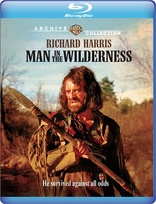Man in the Wilderness Blu-ray Movie
HomeMan in the Wilderness Blu-ray Movie 
Warner Archive CollectionWarner Bros. | 1971 | 105 min | Rated PG | Aug 16, 2016
Movie rating
7.3 | / 10 |
Blu-ray rating
| Users | 4.5 | |
| Reviewer | 3.5 | |
| Overall | 3.5 |
Overview
Man in the Wilderness (1971)
In 1820, a group of fur trappers are returning with their goods to civilization. When guide Zachary Bass is injured in a bear attack, they leave him behind to die, but Bass recovers -- and pursues.
Starring: Richard Harris (I), John Huston, Henry Wilcoxon, Percy Herbert, James DoohanDirector: Richard C. Sarafian
| Western | Uncertain |
| Adventure | Uncertain |
Specifications
Video
Video codec: MPEG-4 AVC
Video resolution: 1080p
Aspect ratio: 2.40:1
Original aspect ratio: 2.35:1
Audio
English: DTS-HD Master Audio 2.0 Mono (48kHz, 24-bit)
French: Dolby Digital 2.0 Mono
Spanish: Dolby Digital 2.0 Mono
Spanish=Latin & Castillian
Subtitles
English SDH, French, Japanese, Spanish
Discs
Blu-ray Disc
Single disc (1 BD)
Playback
Region free
Review
Rating summary
| Movie | 3.5 | |
| Video | 4.5 | |
| Audio | 4.0 | |
| Extras | 0.5 | |
| Overall | 3.5 |
Man in the Wilderness Blu-ray Movie Review
Quiet Desperation
Reviewed by Michael Reuben August 16, 2016The "revisionist" Western may have peaked in the Nineties with the critical and box office success of Unforgiven and Dances with Wolves, but the trend began much earlier. During the restless experimentation of the Seventies, filmmakers as varied as Arthur Penn (Little Big Man), Robert Altman (McCabe and Mrs. Miller) and Clint Eastwood (The Outlaw Josey Wales) offered their own subversive takes on the genre. A lesser known entry is director Richard C. Sarafian's (Vanishing Point) 1971 spiritual adventure, Man in the Wilderness. The script by Jack DeWitt (A Man Called Horse) was partly drawn from the same historical events that inspired The Revenant, but Sarafian's film is a very different experience. The Warner Archive Collection is releasing Wilderness in tandem with a second Seventies Western starring Richard Harris, The Deadly Trackers. Both films challenge genre conventions, but Wilderness†is by far the superior work.
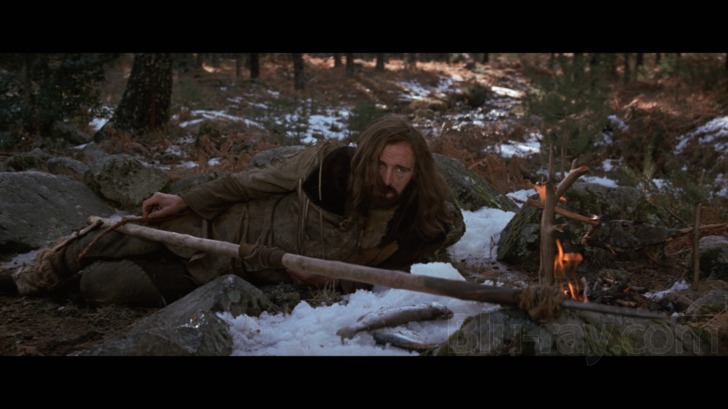
Wilderness†focuses on an 1820 trapping expedition to the Northwest territory led by Captain Henry (John Huston), a former naval commander. As the film opens, Henry and his crew are hauling a wooden barge loaded with animal pelts eastward toward the Missouri River, where they intend to sail south to sell their cargo. The crew includes a scout named Zach Bass (Harris), who has served the captain since escaping an orphanage as a boy and stowing away on Henry's ship. The captain is an Ahab-like figure in both garb and demeanor, but Bass holds a special place in his esteem, both for the scout's abilities and for his stubborn individualism.
Despite his regard for Bass, Captain Henry does not hesitate to abandon him after the scout is so savagely mauled by a bear that his survival is deemed impossible. But, miraculously, Bass survives. Barely able to move at first, he manages to drink water from a stream and allay hunger with berries. As Bass gains strength, he gradually expands his capabilities, using bark and leaves as bandages and blankets, fashioning tools for hunting and fishing, and constructing a crutch that allows him to walk. When he has sufficiently recovered, Bass sets off in pursuit of Captain Henry and his party, although his purpose is unclear, even to himself.
Throughout Bass's recovery, he is haunted by memories, including the orphanage's strict religious instruction, against which Bass rebelled, and the wife, Grace (Prunella Ransome), who assured him that God was within him and whom Bass left when she was pregnant to return to sea. Bass's memories illuminate Captain Henry's assertion that "he fought against life all his life", and they also provide a counterpoint to his present circumstances, as he observes nature's amoral spectacle of predators, prey and fierce competition for the basics of survival (his battle with two wolves feeding on a still-breathing buffalo is especially memorable). A chance encounter with a Native American woman who must interrupt her journey through the wilderness to give birth provides a further demonstration of life's stubborn persistence even under the harshest of circumstances.
Intercut with Bass's efforts are the continuing trials of Captain Henry and his party, whose progress has been impeded by numerous obstacles, including encounters with a group of Native Americans upon whom the captain immediately opens fire, assuming them to be hostile. The captain's single greatest impediment, however, is his insistence on remaining encumbered with the ship's deadweight, which must be dragged across forest and mountain by mules, even as many of his crew urge that they abandon the vessel and use the mules to transport their cargo. Captain Henry is also troubled by the growing premonition, perhaps reflecting pangs of conscience, that Bass is pursuing him to seek revenge.
Wilderness could almost be a silent film. Except for a long monologue in which Captain Henry recounts his history with Bass, the dialogue is minimal, and the film's most loquacious character is a Native American chief (Henry Wilcoxon) whose roving Indian band encounters both Henry and Bass and whose pronouncements in his native tongue remain untranslated. Scenes play at length with barely a spoken word, and director Sarafian relies on facial expressions and the ever-changing landscape to evoke a sense of wonder and mystery. While Captain Henry and his crew are battling both the land and its inhabitants, Bass is gradually and painfully establishing a rapport with the wilderness in which he has been stranded. By the time he overtakes Henry's expedition, which is on the verge of failing altogether, Bass has been transformed.
Man in the Wilderness Blu-ray Movie, Video Quality 
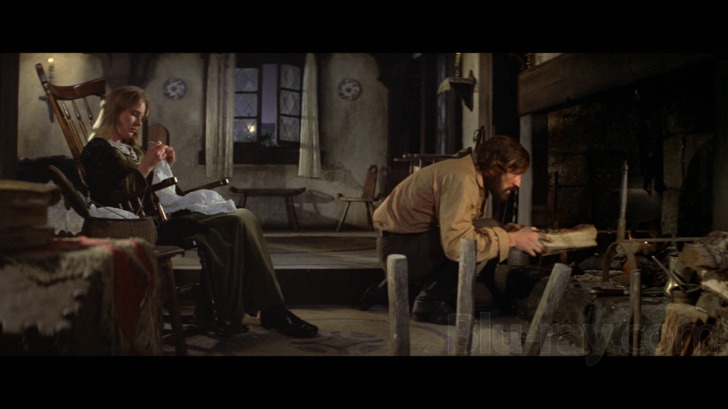
Man in the Wilderness†was shot by British cinematographer Gerry Fisher, whose varied credits
include Wolfen, The Exorcist III and The Ninth Configuration. Because the film's negative had
been used to generate multiple release prints, it had sustained substantial wear and damage,
which was "printed in" on the IP scanned at 2K by the Warner Archive Collection for this 1080p,
AVC-encoded Blu-ray. Substantial cleanup and repair, as well as extensive color correction,
were required to return the film to its original condition, but the results are remarkable. Fisher's
widescreen vistas of the film's landscapesódense forests, open prairies, snow-covered mountain
slopesóhave been rendered with striking sharpness and minute detail in both faces and objects.
The same is true of the many closeups of Harris' Zach Bass in his various stages of injury and
recovery. The palette alternates between the rich earth tones of Bass's makeshift encampment to
the chilly blues and whites that increasingly accompany Captain Henry's dubious expedition.
Nighttime blacks are deep and solid, and the film's grain structure is finely resolved. Fleeting
blue edges are artifacts of the original photography.
WAC has mastered Man in the Wilderness†at its usual target bitrate of just under 35 Mbps, with a
capable encode.
Man in the Wilderness Blu-ray Movie, Audio Quality 
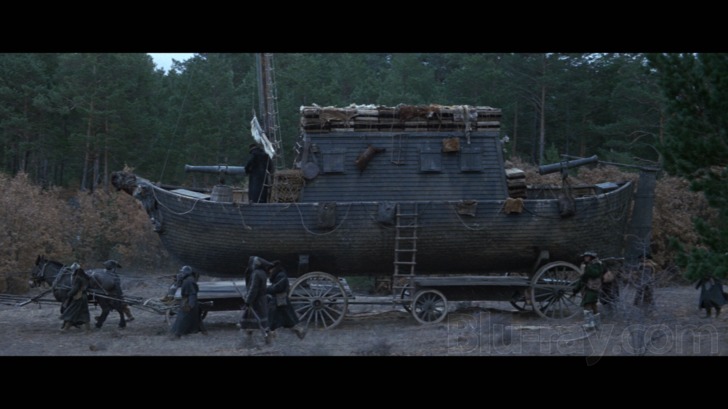
Man in the Wilderness' mono soundtrack has been taken from the original magnetic masters, which had so deteriorated over the years that extensive restoration was required to remove noise, clicks, pops and thumps. Even so, the score by Johnny Harris (a favorite of both director Sarafian and star Harris) has limited dynamic range and a brittle upper end, but these issues appear to be inherent to the source. Fortunately, Harris' score is sparingly used, and much of Wilderness†plays with nothing more than sounds of the natural world surrounding both Zach Bass and Captain Henry's expedition. Long stretches of relative quiet intensify the impact of sudden eruptions like the bear that attacks Bass or the snarling wolves he has to fight off so that he can feed himself from their prey. The lean dialogue is clear and intelligible for the most part, with an occasional line buried in the mix; here again, this appears to be inherent to the source.
Man in the Wilderness Blu-ray Movie, Special Features and Extras 
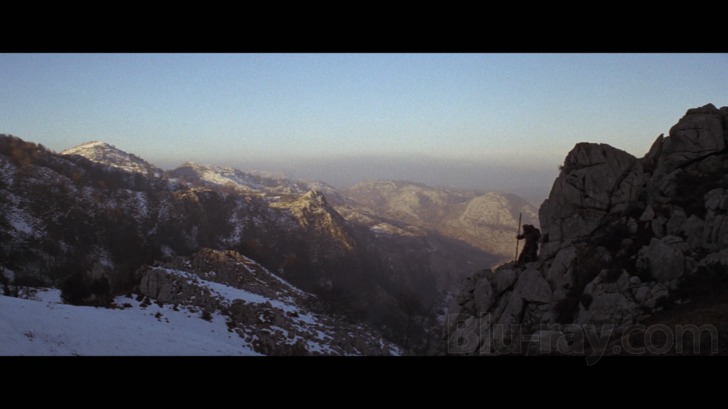
The sole extra is the film's trailer (1080p; 1.78:1; 3:02), which has been remastered in 1080p. Warner's 2008 release of Man in the Wilderness in a two-DVD set with The Deadly Trackers was similarly bare.
Man in the Wilderness Blu-ray Movie, Overall Score and Recommendation 
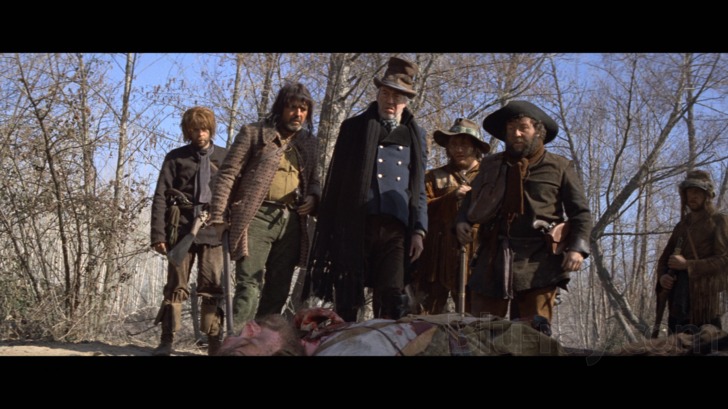
Man in the Wilderness was popular in its day and has retained a following, but its cinematic style
is more arthouse than mainstream. Its sustained takes, which invite the audience to contemplate
nature much as Bass is doing, may try the patience of contemporary viewers accustomed to faster
editing rhythms and more direct exposition. Still, once expectations are adjusted, the film is a
memorable experience, alternating between a brooding, dream-like atmosphere and a painfully
realistic depiction of Bass's injuries and gradual recovery. Recommended.
Similar titles
Similar titles you might also like

Jeremiah Johnson
Warner Archive Collection
1972

Pale Rider 4K
1985

The White Buffalo
2K Restoration
1977

Valdez Is Coming
1971

Shalako
1968

The Big Trail
1930

Navajo Joe
Special Edition
1966

The Sisters Brothers
2018

Vengeance
1968

Ace High
I quattro dell'Ave Maria
1968

Chato's Land
2K Restoration
1972

Will Penny
1968

Only the Valiant
1951

The Way West
1967

Last of the Dogmen
1995

Blueberry
Renegade
2004

Macho Callahan
1970

Shoot Out
1971

The Outsider
2019

The Ballad of Lefty Brown
2017
